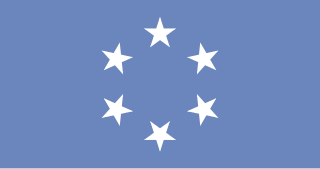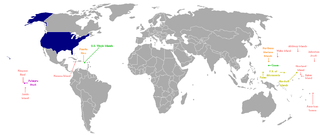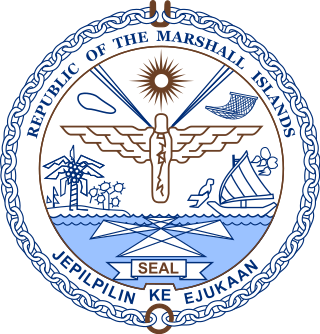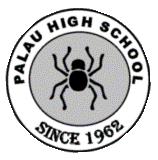| ||||||||||||||||||||||
| Results | ||||||||||||||||||||||
|---|---|---|---|---|---|---|---|---|---|---|---|---|---|---|---|---|---|---|---|---|---|---|
| ||||||||||||||||||||||
 |
|---|
A referendum on holding separate negotiations on its future status was held in the Palau part of the Trust Territory of the Pacific Islands in September 1976. [1] The proposal was approved by 88% of voters. [1]
| ||||||||||||||||||||||
| Results | ||||||||||||||||||||||
|---|---|---|---|---|---|---|---|---|---|---|---|---|---|---|---|---|---|---|---|---|---|---|
| ||||||||||||||||||||||
 |
|---|
A referendum on holding separate negotiations on its future status was held in the Palau part of the Trust Territory of the Pacific Islands in September 1976. [1] The proposal was approved by 88% of voters. [1]
| Choice | Votes | % |
|---|---|---|
| For | 2,780 | 87.70 |
| Against | 390 | 12.30 |
| Invalid/blank votes | 100 | – |
| Total | 3,270 | 100 |
| Registered voters/turnout | ||
| Source: Direct Democracy | ||

Palau, officially the Republic of Palau and historically Belau, Palaos or Pelew, is an island country and microstate in the western Pacific. The nation has approximately 340 islands and connects the western chain of the Caroline Islands with parts of the Federated States of Micronesia. It has a total area of 466 square kilometers (180 sq mi). The most populous island is Koror, home to the country's most populous city of the same name. The capital Ngerulmud is located on the nearby island of Babeldaob, in Melekeok State. Palau shares maritime boundaries with international waters to the north, the Federated States of Micronesia to the east, Indonesia to the south, and the Philippines to the northwest.

The Trust Territory of the Pacific Islands (TTPI) was a United Nations trust territory in Micronesia administered by the United States from 1947 to 1994.

Palau gained its independence October 1, 1994, with the entry into force of the Compact of Free Association with the United States. Palau was the last Trust Territory of the Pacific Islands territories to gain its independence. Under the Compact, the U.S. remains responsible for Palau's defense for 50 years.

The Pacific Islands Forum (PIF) is an inter-governmental organization that aims to enhance cooperation between countries and territories of Oceania, including formation of a trade bloc and regional peacekeeping operations. It was founded in 1971 as the South Pacific Forum (SPF), and changed its name in 1999 to "Pacific Islands Forum", so as to be more inclusive of the Forum's Oceania-spanning membership of both north and south Pacific island countries, including Australia. It is a United Nations General Assembly observer.
An associated state is the minor partner in a formal, free relationship between a political territory and a major party—usually a larger nation.

The Compact of Free Association (COFA) is an international agreement establishing and governing the relationships of free association between the United States and the three Pacific Island sovereign states of the Federated States of Micronesia (FSM), the Republic of the Marshall Islands (RMI), and the Republic of Palau. As a result, these countries are sometimes known as the Freely Associated States.
Modekngei, or Ngara Modekngei, is a monotheistic religious movement founded around 1915 by "Tamadad," a native of the island of Babeldaob, that spread throughout Palau. It rose to political significance between the First and Second World Wars and is currently professed by 5.7% of Palau's population. Modekngei is a hybrid of ancient Palauan customs and Christianity. Followers of the religion believe in the Christian God, recognize Jesus Christ as the Messiah, and simultaneously make appeasements to the traditional Palauan deities.

The House of Delegates of Palau is the lower house of the Palau National Congress, Palau's bicameral legislature. The Senate of Palau is the upper house. The House of Delegates has 16 members, each serving four-year terms in single-seat constituencies. Each state represents one constituency. No political parties exist. The last election was held on 3 November 2020.
Bull is an American drama series created by Michael S. Chernuchin that aired on TNT from August 15, 2000, to January 31, 2001. The show's name is in reference to the bull market, but the airing of the series coincided with the dot-com bubble crash that turned what had until then been a bull economy in the United States into a bear market. In February 2001 the series was cancelled after airing 12 of the planned 20 episodes.
Edham Mamet is a Uyghur refugee best known for the more than seven years he spent in the United States Guantanamo Bay detention camps, in Cuba. He was captured in Afghanistan in November 2001. Edham Mamet is one of the 22 Uighurs held in Guantanamo for many years despite the fact that it became clear early on that they were innocent.
The original member states of theWorld Trade Organization are the parties to the General Agreement on Tariffs and Trade (GATT) after ratifying the Uruguay Round Agreements, and the European Communities. They obtained this status at the entry into force on 1 January 1995 or upon their date of ratification. All other members have joined the organization as a result of negotiation, and membership consists of a balance of rights and obligations. The process of becoming a World Trade Organization (WTO) member is unique to each applicant country, and the terms of accession are dependent upon the country's stage of economic development and the current trade regime.

The defense of Palau is the responsibility of the United States, but local police matters are handled by the Palau Police, the national police force. Some of the sixteen states also had separate police departments during the 1980s and 1990s.
USS LST-607 was a United States Navy LST-542-class tank landing ship in commission from 1944 to 1946. She later served in a non-commissioned status in the Military Sea Transportation Service as USNS LST-607 (T-LST-607).

Roman Tmetuchl was a Palauan political leader and businessman. He grew up in Japanese-controlled Palau and joined the Kempeitai, the Japanese secret police, during World War II. After the war, he became the leader of Palau's Liberal Party. He worked in the Congress of the Trust Territory of the Pacific Islands from 1964 to 1978 and advocated for Palau gaining a separate status from the rest of Micronesia. He became governor of Airai and engaged in three unsuccessful Palauan presidential campaigns. As a businessman, Tmetuchl led several construction projects for his business holdings and for the Palauan community, including the Palau International Airport and a Seventh-Day Adventist clinic.

United Nations Security Council resolution 683, adopted on 22 December 1990, after recalling Resolution 21 (1947) which approved the Trusteeship Territory of the Japanese Mandated Islands as well as Chapter XII of the United Nations Charter which established the United Nations Trusteeship system, the council determined that, in the light of entry into force of new status agreements for Federated States of Micronesia, the Marshall Islands and the Northern Mariana Islands, the objectives of the Trusteeship Agreement had been completed and therefore ended the Trusteeship Agreement with those entities.

A second referendum on the Compact of Free Association was held in Palau on 4 September 1984, after the previous referendum had failed to achieve the 75% in favour necessary. Voters were asked two questions:

A referendum on holding separate negotiations on their future status was held in the Marshall Islands part of the Trust Territory of the Pacific Islands on 30 July 1977. The proposal was approved by 62% of voters.

An independence referendum for Chuuk State to secede from the Federated States of Micronesia was originally scheduled to take place in March 2015. However, it has been delayed three times and it is uncertain if it will take place. The most populous of the four states within the FSM, Chuuk has high levels of unemployment and there are long-standing tensions over the distribution of funding within the FSM. Other concerns include political power within the federation and the preservation of cultural identity.

Palau High School (PHS) is a senior high school in Koror City, Palau. Opened in 1962, it is the country's only public high school, and the first high school established in Palau. The Western Association of Schools and Colleges (WASC) accredits the school.
Palauan nationality law is regulated by the 1980 Constitution of Palau, as amended; the 1994 Palau Citizenship Act, and its revisions; and international agreements entered into by the Palauan government. These laws determine who is, or is eligible to be, a national of Palau. The legal means to acquire nationality, formal legal membership in a nation, differ from the domestic relationship of rights and obligations between a national and the nation, known as citizenship. Palauan nationality is typically obtained either on the principle of jus soli, i.e. by birth in Palau or under the rules of jus sanguinis, i.e. by birth abroad to parents with Palauan nationality. It can be granted to persons with an affiliation to the country through naturalization.